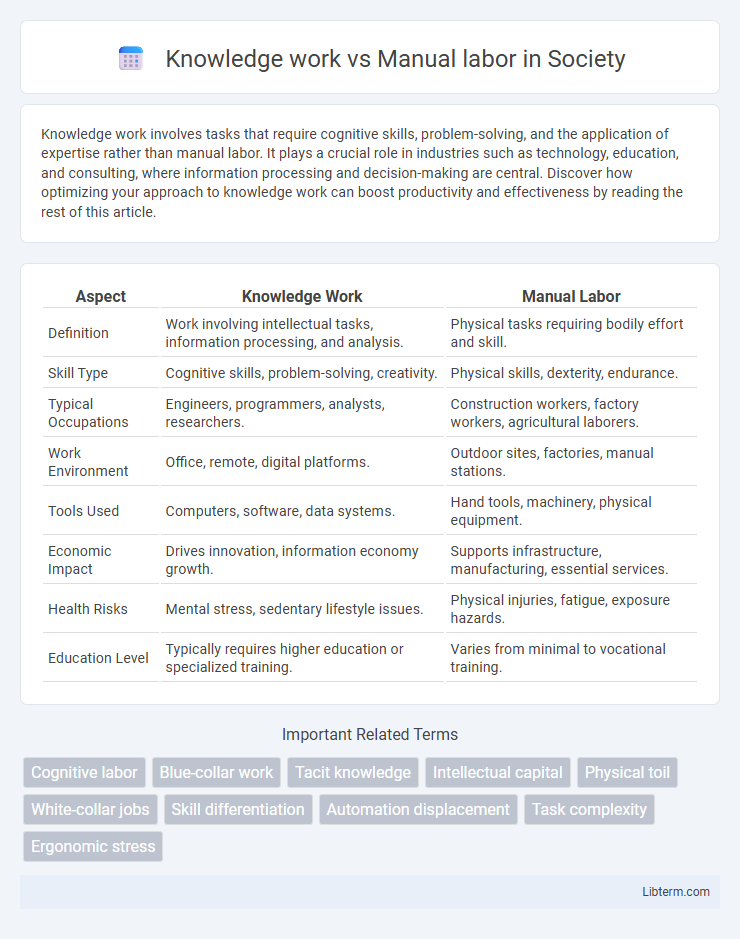Knowledge work involves tasks that require cognitive skills, problem-solving, and the application of expertise rather than manual labor. It plays a crucial role in industries such as technology, education, and consulting, where information processing and decision-making are central. Discover how optimizing your approach to knowledge work can boost productivity and effectiveness by reading the rest of this article.
Table of Comparison
| Aspect | Knowledge Work | Manual Labor |
|---|---|---|
| Definition | Work involving intellectual tasks, information processing, and analysis. | Physical tasks requiring bodily effort and skill. |
| Skill Type | Cognitive skills, problem-solving, creativity. | Physical skills, dexterity, endurance. |
| Typical Occupations | Engineers, programmers, analysts, researchers. | Construction workers, factory workers, agricultural laborers. |
| Work Environment | Office, remote, digital platforms. | Outdoor sites, factories, manual stations. |
| Tools Used | Computers, software, data systems. | Hand tools, machinery, physical equipment. |
| Economic Impact | Drives innovation, information economy growth. | Supports infrastructure, manufacturing, essential services. |
| Health Risks | Mental stress, sedentary lifestyle issues. | Physical injuries, fatigue, exposure hazards. |
| Education Level | Typically requires higher education or specialized training. | Varies from minimal to vocational training. |
Defining Knowledge Work and Manual Labor
Knowledge work involves tasks that require cognitive skills, problem-solving, and expertise, such as analyzing data, creating strategies, or designing solutions. Manual labor consists of physical tasks that involve bodily effort and skill, including construction, assembly, and maintenance activities. Defining knowledge work emphasizes intellectual input and innovation, whereas manual labor prioritizes physical execution and tangible output.
Historical Evolution of Work Types
The historical evolution of work types reveals a shift from predominantly manual labor during agrarian and early industrial societies to knowledge work in the post-industrial era, driven by advancements in technology and education. The rise of information technology and globalization has amplified the demand for cognitive skills, problem-solving, and digital literacy, distinguishing knowledge work from manual labor's reliance on physical effort and repetitive tasks. This transformation has reshaped labor markets, workplace structures, and economic models, emphasizing intellectual capabilities over physical endurance.
Core Skills Required in Knowledge Work
Core skills required in knowledge work include critical thinking, problem-solving, and advanced communication abilities essential for analyzing information and making informed decisions. Proficiency in digital literacy, data analysis, and domain-specific expertise enables knowledge workers to manage complex tasks and innovate effectively. Unlike manual labor, knowledge work demands continuous learning and adaptability to evolving technologies and industry trends.
Essential Skills in Manual Labor
Essential skills in manual labor include physical strength, coordination, and technical proficiency with tools and machinery. Workers must possess problem-solving abilities related to hands-on tasks, spatial awareness, and adherence to safety protocols. These competencies enable efficient execution of physically demanding jobs in construction, manufacturing, and agriculture sectors.
Economic Impact of Knowledge Work
Knowledge work drives economic growth through innovation, higher productivity, and value creation in sectors such as technology, finance, and healthcare. It leads to increased wages, improved living standards, and a more skilled workforce compared to manual labor, which tends to emphasize physical tasks with lower economic output. Investments in education and technology amplify the economic impact of knowledge work by enabling continuous advancements and competitive advantages in global markets.
Economic Contribution of Manual Labor
Manual labor significantly drives economic growth through roles in construction, manufacturing, and agriculture, generating substantial output and employment opportunities. These sectors contribute a large portion of GDP in developing economies, providing essential goods and infrastructure that support other industries. Despite automation trends, the sustained demand for skilled manual workers remains critical for maintaining productivity and local economic stability.
Challenges Faced by Knowledge Workers
Knowledge workers encounter challenges such as information overload, which complicates decision-making and reduces productivity. They must continuously update skills to keep pace with rapid technological advancements and evolving industry standards. Managing work-life balance proves difficult due to often unpredictable workloads and high cognitive demands inherent in knowledge-intensive tasks.
Challenges Facing Manual Laborers
Manual laborers face challenges such as physical strain, risk of injury, and job insecurity due to automation and outsourcing. Limited access to advanced training and skill development hinders career growth in comparison to knowledge workers. Economic instability and lack of benefits further exacerbate the difficulties faced by workers in manual labor sectors.
Future Trends in Knowledge and Manual Work
The future of work emphasizes a shift towards knowledge-based roles driven by artificial intelligence, automation, and digital collaboration tools, increasing demand for cognitive skills and continuous learning. Manual labor is evolving with robotics, exoskeletons, and augmented reality enhancing productivity, safety, and precision on job sites. Hybrid models combining knowledge work and manual expertise are emerging across industries, fostering innovation through integrated human-machine teamwork.
Bridging the Gap: Integrating Knowledge and Manual Skills
Bridging the gap between knowledge work and manual labor enhances productivity by combining cognitive expertise with hands-on skills, fostering innovation and efficiency in various industries. Integrating digital tools and automation with skilled craftsmanship ensures real-time data utilization and precision in complex tasks. Cross-disciplinary training programs empower workers to adapt, merging theoretical understanding with practical application for optimized performance.
Knowledge work Infographic

 libterm.com
libterm.com